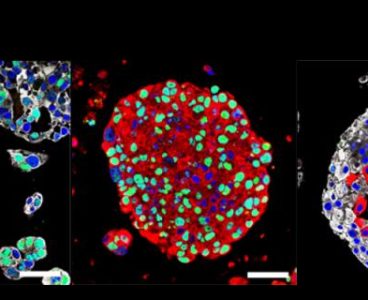
Novel Precision Medicine Trial for Metastatic Pancreatic Cancer
World’s Smallest Tape Recorder is Built From Microbes
Skin Patch Shrinks “Love Handles” in Mice
Researchers have devised a medicated skin patch that can turn energy-storing white fat into energy-burning brown fat locally while raising the body’s overall metabolism. The patch could be used to burn off pockets of unwanted fat such as “love handles” and treat metabolic disorders, such as obesity and diabetes, according to researchers at Columbia University…
Scientists Capture First Image of Major Brain Receptor in Action
Columbia University Medical Center (CUMC) researchers have captured the first three-dimensional snapshots of the AMPA-subtype glutamate receptor in action. The receptor, which regulates most electrical signaling in the brain, is involved in several important brain activities, including memory and learning. The findings were published today in Nature. “With our new findings, we can now, for the…
Select Memories Can Be Erased, Leaving Others Intact
Different types of memories stored in the same neuron of the marine snail Aplysia can be selectively erased, according to a new study by researchers at Columbia University Medical Center (CUMC) and McGill University and published today in Current Biology. The findings suggest that it may be possible to develop drugs to delete memories that trigger anxiety and…
New Lung ‘Organoids’ in a Dish Mimic Features of Full-Size Lung
New lung “organoids”–tiny 3-D structures that mimic features of a full-sized lung–have been created from human pluripotent stem cells by researchers at Columbia University Medical Center (CUMC). The team used the organoids to generate models of human lung diseases in a lab dish, which could be used to advance our understanding of a variety of…
In Alzheimer’s, Excess Tau Protein Damages Brain’s GPS
Columbia University Medical Center (CUMC) researchers have discovered that the spatial disorientation that leads to wandering in many Alzheimer’s disease patients is caused by the accumulation of tau protein in navigational nerve cells in the brain. The findings, in mice, could lead to early diagnostic tests for Alzheimer’s and highlight novel targets for treating this…
Smell Test May Predict Early Stages of Alzheimer’s Disease
Researchers from Columbia University Medical Center (CUMC), New York State Psychiatric Institute, and NewYork-Presbyterian reported that an odor identification test may prove useful in predicting cognitive decline and detecting early-stage Alzheimer’s disease. Their two studies, presented at the Alzheimer’s Association’s International Conference in Toronto, Canada, suggest that the University of Pennsylvania Smell Identification Test (UPSIT)…







